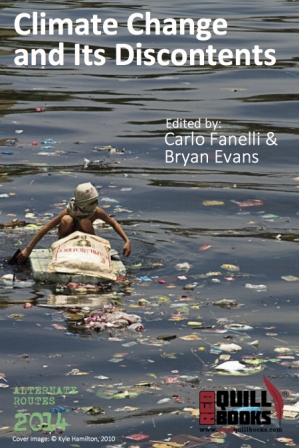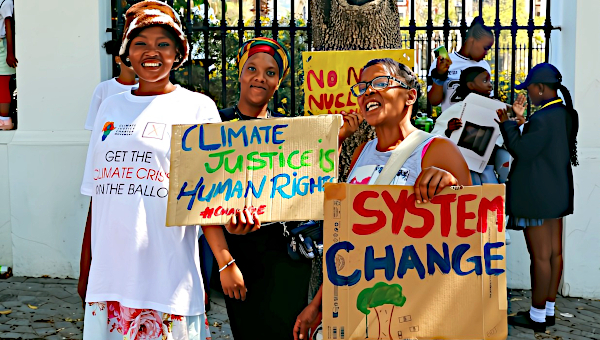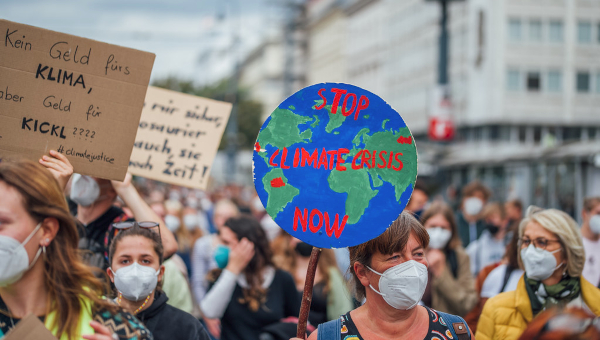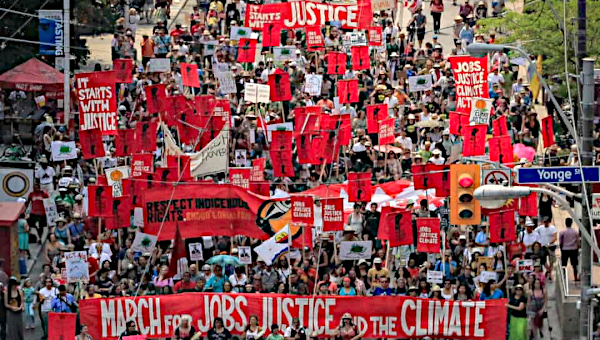“Climate change is life or death. It is the new global battlefield. It is being presented as if it is the problem of the developed world. But it’s the developed world that has precipitated global warming.”
— Noble Peace Prize winner Wangari Maathai.
The 2014 issue of Alternate Routes came together as the Intergovernmental Panel on Climate Change (IPCC) released its fifth report in Stockholm, Sweden. Founded in 1988 by the United Nations (UN) and the World Meteorological Organization, the most recent IPCC report brings together over 600 climate scientists from over 130 countries. Because every last word of the IPCC reports must be signed off by all UN members, the reports are among the world’s most comprehensively vetted and exhaustively reviewed scientific publications. As a result of this wide-ranging consensus, however, it is by design conservative, drawing attention only to the most expansively agreed upon scientific consensuses. Despite the conservatism, however, 2013 IPCC co-chair Thomas F. Stocker made clear that “Climate change is the greatest challenge of our time… In short, it threatens our planet, our only home.” (Gilis, 2013).

Since the publication of the IPCC’s first assessment report in 1990, the scientific evidence demonstrating that anthropogenic climate change
is intensifying around the world has been strengthened. In 1995, the IPCC estimated that it was “more likely than not” (which
translates to a 50 per cent probability) that human-produced greenhouse gases (GHG) – as opposed to natural variability – were the main causes of climate change. This certainty rose to “likely” (66 per cent) in 2001, “very likely” (90 per cent) in 2007 and now stands at “extremely likely” (95 per cent). The 2013 report puts an exclamation point on what is already known about anthropogenic climate change, refining our understandings and deepening interconnections among them. It is perhaps not a stretch of the imagination to suggest that if present trends continue the next report slated for publication sometime in 2019-2020 will increase this probability of occurrence to “virtually certain” (99 per cent). When it comes to the science of anthropogenic climate change, like evolution, the debate is over: It is no longer a matter of debate whether or not human activity is influencing climate change, but the speed and scope of such change and its potential consequences for all life systems. Indeed, more than 97 per cent of peer-reviewed climate scientists argue that the globe is warming as a result of anthropogenic GHG emissions. Put differently, of some 33,700 peer-reviewed climate change papers published between 1991 and 2012, only 34 rejected that climate change was caused by human activities (Powell, n.d.; 2012).[1]
Understanding Climate Change as a Political Process
And yet, despite the overwhelming scientific consensus, climate change continues largely unabated. In light of the overwhelming scientific consensus how is it that nearly half of Britons and Americans, and some 42 per cent of Canadians, believe that human activities are not affecting climate change? Despite the consensus or perhaps precisely because of it, it is a mistake to assume that valid science will communicate itself (Dembicki, 2013). Rather, because people are not inherently radical or conservative but adapt to the structured conditions they encounter, a multiplicity of factors from diverse interests and levels of class consciousness to personal experiences, socio-economic status, race, gender, culture and political ideology play a central role in the acceptance or rejection of climate change science. These deeply ingrained sentiments, mediated by competing narratives jostling for hegemony, obscure our understanding of climate change as an inherently political process. It is little wonder, then, that white elites, in particular men, overwhelmingly deny climate change. While just over 7 per cent of non-white U.S. men believe that the potential impacts of climate change are exaggerated or unlikely to happen, this number jumps to nearly 30 per cent of white males and increases in tandem as perceived understanding of climate change rises (McCright and Dunlap, 2011; Pyper, 2011). “A position on climate change has become almost like a tribal totem… I am conservative, therefore, I cannot believe in climate change.” (Lewandowski in Mooney, 2013).
Conservatives tend to question climate change not only on the validity of its scientific conclusions, but equate understanding with broader political and ideological factors such as a skepticism of government or university funded research, liberal conspirational theories, perceived misrepresentations of the data, a belief in the infallibility of markets and technology, media biases, distrust of scientists’ alleged political leanings, and perceived injustices against individual liberties and profit-making freedoms (Washington and Cook, 2011; Oreskes and Conway, 2012; Dunlap and Jacques, 2013). Of course, ideological and identificational factors span the political spectrum, but climate change denialism tends to overwhelmingly be the refuge of conservatism. While some 3 per cent of climate scientists deny that human activities are directly associated with climate change, skeptics and denialists tend to make up 34 per cent of U.S. media coverage (Cook et al., 2013). And climate change coverage by the media is diminishing across the U.S. and Canada having dropped 20 per cent in 2011 over 2010, and more than 40 per cent since 2009. This is evident in fewer reporters covering stories, fewer outlets publishing articles and, perhaps most strikingly, a particular silence (and 50 per cent decline) from the nation’s editorial boards denouncing the lack of action on climate change (Zerbisias, 2012). The growing import of climate change denialists in the popular press and, subsequently, society at large, has risen despite increasing scientific agreement among scientists to the contrary. This is in no small part explained by vast clandestine networks of climate change denial – from media personalities to think-tanks, academics and politicians – that have spent more than $120-million between 2002-2010 to discredit climate change science (Goldenberg, 2013; Greenpeace, 2013).
Interest in climate change decreased just as the economic turbulence, political instability and social
insecurity of the Great Recession made its way around the world. But as Angel Gurria, secretary general of the Organization for Economic Cooperation and Development reminded: “This [climate change] is worse than a debt because there is no bailout and if you have two or three good budget years a debt can be reduced, but emissions hang around for 100 years.” (CBC, 2013). In fact, the 2013 IPCC report emphasizes that things are getting worse more rapidly than the best previous models could predict. From global temperature increases to melting ice sheets, retreat of glaciers, rising and acidifying oceans, deforestation, shifts in weather patterns, food chains, plant and animal life, water shortages and massive species extinctions, socio-ecological crises are escalating across the biosphere. For example, the 2013 report estimates that global temperatures will increase somewhere between 1.8 and 4 degrees Celsius by the midway point of this century; sea levels could rise between 18 and 59 centimeters, especially if recent melting in Greenland and Antarctica continues, by the end of this century; Arctic sea ice could disappear by the summer of 2050; and extreme rainfall and heat waves will likely increase in frequency. What’s more, even if emissions were stabilized today these trends would continue well into the future as some 60 per cent of CO2 emissions remain in the atmosphere for 20 years, 45 per cent remains for 100 years and 20 per cent remains 1,000 years after which they are emitted.
It is important to emphasize that for the past five-hundred thousand years GHG’s have fluctuated in a narrow band of between 260 and 280 parts per million (ppm). Today, however, they are over 400ppm CO2, which is roughly 30 per cent higher than previous peaks in volume during interglacial periods. The report stresses that beyond a 2 degree Celsius temperature rise, humans could lose the ability to take actions that would substantially remedy or mitigate climate change, after which a “danger zone” would be entered in which the climate could become unpredictable and the consequences largely unforeseen. It has been estimated that if present trends continue two-thirds of the world population could suffer from water shortages, 12 per cent of bird species and 25 per cent of mammals are threatened with extinction and over 70 per cent of the earth’s fisheries could become depleted, fully-fished and/or over-exploited (Woodin & Lucas, 2004; Gupta, 2001). Climate scientists predict that food production could be cut in half, having already risen 140 per cent in cost between 2002-2008, and threatening some 2 billion food insecure and impoverished persons around the world. What’s more, the Amazon rainforest – dubbed the lungs of the world – could turn to a dry savannah, while melting icecaps could raise sea levels by more than 30 per cent worldwide engulfing land presently occupied by more than 1 billion people (Lean, 2007; Walsh, 2013).
The 2013 IPCC report does not take into account worst case or supposed scenarios such as the releasing of terrestrial and oceanic methane (a GHG thirty times more potent than CO2) as a result of thawing permafrost and undersea reserves. But threatening messages about climate change have their limitations (for a snapshot of the debate see, Lilley et al., 2012; Angus, 2013). Thus while there is certainty about the severity of climate change, the IPCC reports remain moderate reflecting only what are “extremely likely” projections. As one well known phrase puts it: ‘Trying to predict climate change is like trying to predict where the next bubble will pop in a pot of boiling water. We understand how the process works but can’t pin-point exactly where the next stream of bubbles will be.’
250 Years of Capitalist Activity
The IPCC report uses the baseline year 1750 to distinguish between pre-industrial and industrial concentrations of GHG emissions, showing a marked increase in the role of human activities in regards to climate change over the period ever since. Despite some 200,000 years of human activity on earth, however, it is only in the last 250 years (and 150 years in particular) that the long-term viability of the earth as a sustainable place for inhabitation has been called into question. In this regard, it is important to stress that the broad frame of human activity masks what is specifically capitalist activity: a historically unique form of social relations based on the exploitation of labour, which alters humankind’s historic relationship with nature creating deep fissures, i.e., a ‘metabolic rift.’ In historical terms, then, destructive anthropogenic climate change is of recent vintage. What, then, lies at the root of climate change?
Grappling with such a question must inevitably reflect on the ways in which climate change and capitalism are symbiotic – that is to say, how the underlying social relations and forces of (re)production (historically unique and dominant since, say, 1750) are in actuality an instituted compulsion. One where the requirements of life are embedded in a political and economic framework that obscures class exploitation through a complex web of market dependence in which cut-throat competition, labour rationality and profit maximization permeate all aspects of social life. This class exploitation which lies at the root of capitalism, at once gendered, racialized and informed by a host of cross-cutting identificational markers, must be central to our understanding of climate change as socio-ecological crises intersect in myriad non-linear and cascading ways.
Since orthodox economists assume that everything has a price and that the market will inherently sort out all problems, mainstream approaches to climate change suffer from an inherent inability to deal adequately with the climate crisis. The assumption that everything, no matter how ecologically destructive, socially unhealthy or politically unjust has profit-making potential and can be solved by technological or market means must inevitably come to terms with the biophysical impossibility of unlimited economic growth. Said differently, if solutions to the climate crisis are to be found they must be radicalized (i.e. get to the root of the problem) and move away from so-called market based solutions to what are ineradicably market based problems: the capitalist system is inherently incompatible with the goal of sustaining the earth for future generations.
The systemic imperatives of capitalism run counter to any socio-ecological notions of natural limits, critical thresholds and limitations on conspicuous consumption, let alone social justice, since all relations are subordinated to profit maximization. In this sense, it is important to recall the words of Engels (1934) who reminds: “[Nature] is the foundation upon which we human beings, ourselves products of nature, have grown up… at every step we are reminded that we by no means rule over nature like a conqueror over a foreign people, like someone standing outside nature – but that we, with flesh, blood and brain, belong to nature, and exist in its midst.” In other words, “Man lives from nature, i.e. nature is his body, and he must maintain a continuous dialogue with it if he is not to die. To say that man’s physical and mental life is linked to nature simply means that nature is linked to itself, for man is a part of nature” (Marx, 1964, p.112).
It is perhaps not a coincidence that such a large segment of conservative and other groups are adamantly opposed to the science of climate change for substantive solutions require a radical reversal of business as usual – that is to say, a critique of political economy that explicitly rejects capitalist growth as an end in itself and proposes alternative means of organizing society. There are no limitedly scientific, technological or market-based solutions to climate change, only social and political ones that challenge the power of capital to exploit workers, the unwaged, those denied a chance to work and the natural environment upon which all life on earth is based.[2] Countering climate change denialism, then, is a process of politicization as information is rarely neutral and scientific evidence seldom speaks for itself. In this regard, the reputation of Canada as an international pariah is especially disconcerting as even the mildest talk of environmental regulation, especially in a recession, sends captains of industry and their political backers into a tailspin threatening further job cuts.
Canada and Climate Change Inaction
Among the first acts of business by the Stephen Harper Conservatives was to, in the iconic words of the Prime Minister, pull out of the “socialist scheme” that is the Kyoto protocol, which in his view was designed to suck money out of rich countries. Since 2006, environmental monitoring, legislation and protective agencies have been steadily gutted. This includes the elimination, reduction and curtailment of over forty environmental programs related to air, water, transport, oil and gas monitoring, agriculture, hazardous waste management, species at risk, weather services and research funding. The most notable of these include over $222-million being cut from Environment Canada, the elimination of over one thousand scientists and over $100-million in funding at the Department of Fisheries and Oceans and Parks Canada, the repeal of the Environmental Assessment Act, Elimination of the Experimental Lakes Area program, changes to the Navigable Waters Protection Act in order to ease transport restrictions on crude oil, and a host of closures to arms-length government agencies as a result of cuts to funding (Nikiforuk, 2013; 2010; CAW, 2013). What’s more, as part of this strategy to delegitimize climate change and social justice activists, Conservative Ministers have gone to great lengths to publically threaten, cajole and intimidate environmental groups characterizing them as anti-Canadian, radical ideologues and foreign saboteurs hijacking the political process (Oliver, 2012; Payton, 2012).
In an effort to turn Canada into an “energy superpower” the Conservatives have pledged to triple tar sands production by 2035, have eased environmental regulations in order to allow mining and oil companies to explore Canada’s Arctic, and have established the “Oil Sands Advocacy Strategy” in the Department of Foreign Affairs. This is on top of subsidies in excess of $1.4-billion to the oil, mining and gas industry, and Herculean efforts to ensure that the Enbridge Northern Gateway and Keystone XL are implemented despite broad-ranging resistance. Part of this strategy has resorted to preventing public scientists from speaking out about Canada’s abysmal environmental record. Indeed, a recent survey of government scientists found that 90 per cent of respondents felt as though they could not speak freely about their work; 86 per cent feared retaliation if they went public about their research on public health or environmental science; 71 per cent felt that political interference compromised policy development based on scientific evidence; nearly half said they were aware of cases in which their department or agency suppressed information for political reasons; and 25 per cent responded to having been asked to directly exclude or alter information for “non-scientific” purposes (Chung, 2013; Cheadle, 2013).[3] Furthermore, 86 per cent (along with four former federal fisheries ministers) said they felt changes to the Fisheries Act would drastically hamper Canada’s ability to protect fish and habitat provisions as only those deemed economically viable would now be covered (Galloway, 2012; Barlow, 2012; Paris, 2012). The chasm between public servants conducting research and elected officials propagating party lines speaks volumes about the political nature of climate change science and the underlying political efforts to stem serious environmental reforms (for a recent example, see, De Souza, 2013).
The federal Conservatives have also been working diligently to undermine stiffer environmental protocols in other countries, such as California’s Low-Carbon Fuel Standard and the European Union’s Fuel Quality Directive. This adds to a growing list of federal international inaction illustrated by Canada’s unwillingness to sign onto a global treaty reining in carbon emissions in Copenhagen in 2009, as well as stifling of plans to implement an international financial transactions tax at the 2010 Toronto G20 meetings. In fact, Canada’s carbon emissions will be 20 per cent higher than the Harper government’s own promised reductions under the 2009 Copenhagen Accord; in actuality some 66 and 107 per cent higher than what is needed to meet Canada’s international obligation to prevent global temperatures from rising 2 degrees Celsius. Not only will the federal Conservatives miss their own emission reduction target cut of 17 per cent below 2005 levels by 2020, they will actually be 2 per cent higher by the end of the decade. Actual emissions in 2011 were twenty-four times higher than 1990 (Environment Canada, 2013).
Canada now stands alone among the G8 as the only nation to not only lack a national housing, transit and infrastructure strategy, but also a national renewable energy program, the last incarnation having been eliminated in 2011. Even the U.S., hardly a bastion of renewable energy investment, spends eighteen times more per capita in federal investments in renewable energy than Canada (Climate Action Network Canada, n.d.). It is plain to see that the federal Conservatives lack any serious plans to deal with climate change. Since 2006 not only has business as usual continued, it has been expanded in scale and scope registering hardly a blip on the federal policy front.[4]
Indeed in policy terms, not only has this exacerbated the class dimensions of climate change as rich nations globally exploit the labour power of the Third World and poor and working-class communities cope with decreased access to public services, transportation, decent work, rising food prices and general social insecurity, but also its simultaneously gendered and racialized implications. Across the Global South, for example, women are overwhelmingly responsible for subsistence agriculture and ecosystems services. Climate change-induced reductions to food crop production, shifting weather patterns, forced migration, war, water shortages and increases in communicable diseases, coupled with women’s generally lower socio-economic status, levels of education, ownership and access to resources, means that although women are largely under-represented in decision-making capacities they must bare the brunt of its consequences.
Though varying in form and intensity, even in the Global North the gendered implications of climate change are significant as women remain responsible for the majority of unpaid domestic labour and are thus often expected to make up for reductions to public services and programs as well as child and elder care, which face added pressures in light of natural disasters, climate displacement, housing, food and water insecurity. Racialized communities, (im)migrants, refugees and those denied status often fare far worse as instances of poverty and malnutrition are intensified by exploitative labour market conditions and higher instances of precarious work. In both North and South, increasing concentration in urban centres without the social and physical infrastructure needed to meet the challenges of climate change threatens to intensify urban air pollution, traffic congestion, water contamination, sanitation issues and the health and well-being of all living systems. Automobile-dependent urban sprawl wipes out farmland reinforcing a sub/urban growth dynamic and expensive low-density infrastructure, while pushing working-class and racialized communities, in particular women and single-parent households, to the margins (UNEP, 2011; Global Gender and Climate Alliance, 2009).
Breaking the cycle of climate change inaction means recognizing the relationship between climate change and capitalism. In an era of unprecedented and growing income inequality, climate change threatens to exacerbate health problems, social injustices and violent conflicts around the world. It has been estimated that capitalist-impelled climate change causes some 300,000 deaths and 5 million illnesses annually. And this is expected to double by 2030. What’s more, inaction is already estimated to cost $125-billion annually and is expected to rise to $600-billion by 2030 (Vidal, 2009). The class composition of climate change is such that those most vulnerable, exploited and degraded will suffer the most as the capitalist class thrives on disaster recognizing them as opportunities (Semeniuk, 2013; CBC, 2013c). As is evidenced from the global tumult of the Great Recession, neoliberal capitalism has emerged stronger and more consolidated than ever despite a temporary, if short-lived, crisis of legitimacy. Never letting a crisis go to waste means using those opportunities as moments to do things that were seemingly unlikely or impossible beforehand.
In Canada, this has meant an emboldened radicalism from conservatives and segments of capital as so-called right-to-work laws, new pressures on privatizing public services, in particular healthcare, pensions and post-secondary education, the removal of public sector collective bargaining rights, the implementation of a free trade agreement with Europe that trumps NAFTA, work for welfare initiatives, attacks against social assistance, the weakening of employment standards legislation, reductions to old age security and the erosion of progressive taxation, once deemed central to the social fabric of Canada, are now destined for the proverbial dustbin of history (Fanelli and Evans, 2012; Banting and Myles, 2013; Himelfarb and Himelfarb, 2013; Swift, 2013; Braedley and Luxton, 2010). Climate change, then, far from necessarily compelling any progressive changes may provide opportunities for capitalism to assert itself as the only alternative regardless of the social, environmental and human costs. As such, dealing with climate change is among the most pressing social and political, that is, class struggles of our time.
Taking Climate Change Seriously
Despite a crisis of capitalism with few historical parallels, anti-capitalist activists have rarely been as isolated and marginalized as they are today.[5] While the economic crisis should have put labour and social justice activists on the offensive, it has been capital that has determined the agenda ushering in a series of regressive reforms that has made life more insecure and precarious for most, while ironically enhancing the lives of those that caused the Great Recession in the first place (Rexrode, 2013; Goodway, 2012). Unfortunately, despite sporadic and localized battles, there has been no subsequent radicalization of labour unions, social movements and anti-capitalist groups in a coordinated and structured way. Developing a movement that challenges austerity and climate change will need to experiment with new forms of organizing that more effectively breaks out of labour and activist subcultures and builds on the heterogeneity of the working-class. One of the few exceptions have been First Nations communities, long subjected to British and later Canadian colonialism, and Idle No More protestors that have defended the rights of the earth against unbridled capitalist exploitation (CBC, 2013b; Barrera, 2013; Dobbin, 2013). While this is not the place for an overview of debates about left regroupment, the challenge facing trade union, environmental and social justice activists is to move to the anti-capitalist Left or risk increasingly becoming an impediment to rather than an instrument of a renewed working-class politics. The failure to do so may regrettably amount to an historic class defeat.
If climate change and overlapping crises – from air, ocean and water pollution to displacement, disease and labour degradation – are to be comprehensively challenged, it will mean addressing not only its effects but its causes: the capitalist system which degrades the earth and alienates labour. This means integrating rather limited but important individual behaviours, lifestyle and consumptive habits into a broader social justice framework that addresses the structural and systemic roots (i.e. exploitative relations and forces of [re]production) of labour and environmental degradation (Albo, 2007). Far from grand-theorizing or proselytizing, foresight, not hindsight, is the only realistic starting point from which to move forward. The challenge is for the working-classes to develop the confidence and capacities to think as ambitiously and radical as capital, the ruling class, has done since the onset of the recession. Taking climate change seriously means rethinking living and working arrangements, leaving fossil fuels in the ground and retooling manufacturing industries to develop an array of renewable energies (e.g. wind, solar, tidal, geothermal), massively expanding public transportation in order to reduce a dependence on individual modes of transportation, renewing local polycultural farming practices, reversing the erosion of progressive taxation, retrofitting homes and industries and, most importantly, moving away from a reliance on the private sector as the engine of economic growth in favour of the expansion of the public sector.

Socializing and democratizing the banking and finance sectors would mean placing social and environmental priorities ahead of board members, stock owners and corporations’ profitability. Reigning in corporate power means recapturing decision-making capacities as part of a larger class project to reclaim and strengthen social and political justice across all facets of life. Additionally, this means dispensing with opaque notions of more or less state and instead emphasizing the need to build a different kind of state – a different kind of society. Unfortunately, social democracy has demonstrated a recurring inability to stand up to austerity, often deepening and extending market forces rather than challenging its central tenets. In order to challenge market forces, rebuilding the political capacities of organized labour is crucial, but so too is organizing the unorganized, unwaged and swaths of workers engaged in low-wage, insecure and precarious forms of work and labour. Rooted in struggles for racial and gender equality, new political formations will need to come to terms with the limitations of militancy alone which, in the absence of a transformative project, has been incapable of countering the drumbeats of austerity and neoliberalism. In the absence of an anti-capitalist politics, then, we risk hampering rather than facilitating political change if we settle for anything less (Williams, 2010; MacKay, 2009; Foster, 2009; Boggs, 2012; Rowbotham et al., 2013; Salleh, 2009).
While redistribution is important, a focus on what happens pre-distribution (i.e. extraction, production, social reproduction) raises a set of demands for non-commodified labour. Putting the needs of the earth’s inhabitants first means that food and water sovereignty, along with housing, healthcare and education, are prioritized as human rights. Universal social programs, from child and elder care to pensions, public spaces, art and cultural centres are crucial to developing a socio-ecological praxis that seeks to deepen and extend collective civic engagement rather than an individualized social policy arena. In light of historically low interest rates, major public works investments in housing, transit, renewable energy, infrastructure and denser development would lessen a reliance on private capital, decarbonizing the economy, encouraging more locally rooted and regionally coordinated production, and socializing access to basic services. Meeting the social and political challenges of climate change within an explicitly anti-capitalist framework is not utopian or impractical, far from it, the real utopians are the ones who think business can continue as usual. Decades of governmental inaction, subterfuge and capitalist class war have shown that the radical is now the only thing that is practical.[6]





